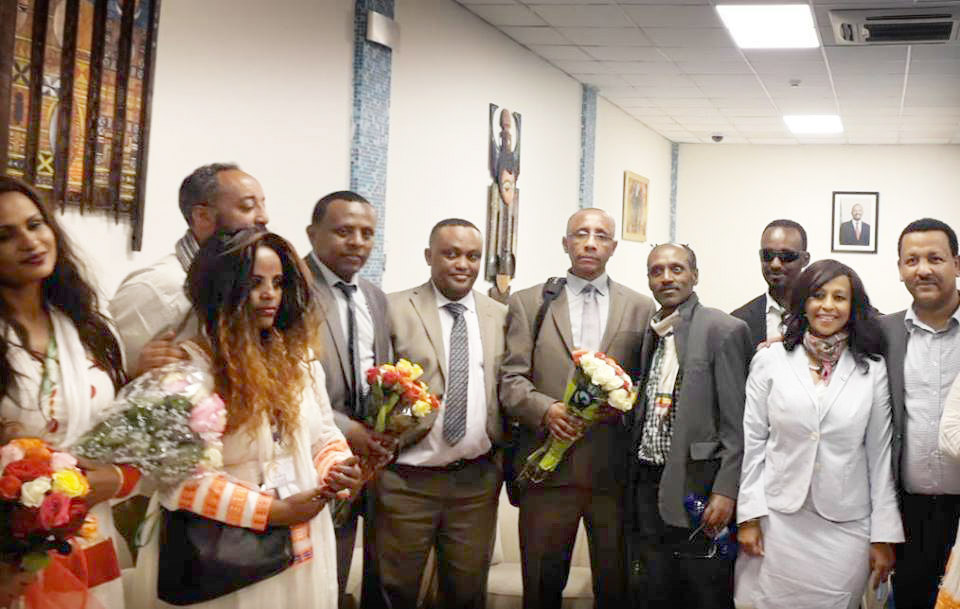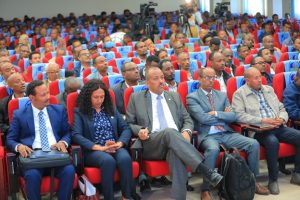
ESAT hits the ground running for dogged coverage of key events
At this ever-changing political landscape for good, understanding the role of media in Ethiopian politics should be the first and necessary step in the ongoing democratization process, media scholars suggest.
Approached by The Ethiopian Herald, Associate Professor Dr. Amanuel Gebru and Assistant Professor Mekuria Mekasha, from School of Journalism and Communication in Addis Ababa University, observe the contemporary local media as more professionally oriented and healthier in its coverage of key events than ever before.
As to them, most of public and some private media were previously held in low regard and criticized for presenting unfair coverage and inaccurate evidence, emphasizing misstatements while ignoring key issues, setting self-interested agendas while ignoring public concerns.
Dr. Amanuel says that the role of media in politics should be providing political and policy information to the society, shaping public opinion, checking government in a watchdog capacity, and bringing democracy and free press in the country.
In this regard, on 1 February 2019, Prime Minister Dr. Abiy Ahmed spoke about the role of media while responding to questions from members of the parliament.
The Premier asserted that the media, in Ethiopia, find it hard to play the role it should be playing. In fact, there are journalists from both private and public media, who are playing constructive role in presenting issues in a balanced manner.
On the contrary, there are also media outlets run for serving the particular interest groups who set agendas for them, Abiy claimed, there were media engaged in fueling division among people, beating the war drum, which is dangerous for safeguarding the peace and democracy of the country.
In relation to this, Dr. Abiy mentioned Sisay Agena of ESAT (Ethiopian Satellite Television Service) as exemplary for presenting rational, balanced, instructive analyses, and much more valued than those delivered by journalists placed here on the state payroll.
Despite many people have perceived biased and prejudiced reports in ESAT, it has met its target largely to promote democracy, respect for human rights and the rule of law in Ethiopia, both Amanuel and Mekuria agreed.
According to sources, ESAT firmly believes that suppression of press freedom, persecution of journalists, and interference in the free flow of information by the Ethiopian regime is harmful and counterproductive to peace, stability and the building of a democratic society.
“ESAT believes that a well-functioning independent press is an essential element of a democratic system by exposing corruption, abuse of power, mismanagement and embezzlement of public resources.”
Believed that they have been successful so far and vowed to serve the people better; a group of ESAT journalists have been entering to Ethiopia from US, Amsterdam and London, and set social event this Sunday at Millennium Hall, Addis Ababa.
Asked that do they really serve the Ethiopian people based on the right principles of journalism and media ethics, Dr. Amanuel says that Ethiopia needs a media which often raises public concern, rather than political wills.
According to him, politics entertained in media has positive and negative impacts on the society; but the media should leave the politics for the politicians alone. The role of the media instead should be developing the principles of objectivity, fairness and impartial report, he suggests.
Mekuria also insists that it is risky if the general public is more exposed to one particular media empire either due to its high popularity or the lack of alternative media sources. In fact, the enormous expansion of private media in Ethiopia is really remarkable; it gives the people the chance to choose the appropriate outlets, he adds.
The Assistant Professor also believes that the primarily objective of a free press is to persistently inspect the government and deliver accurate and impartial information for its target audiences.
For a large part of Ethiopia’s history, the local media was affiliated with particular political parties. After the coming to power of Dr. Abiy Ahmed as the Prime Minister, most of even the state media became increasingly liberated in their regular news coverage.
In theoretical assumptions, media will have put impact over the society in various ways such as agenda setting, priming, framing, and policy driving.
The agenda setting effect is the most researched and documented stories that directly force the government to address on certain issues as top priorities. In addition to agenda setting, the media need to filter or priming multifaceted and complex matters that can able to make careful judgments over political leaders’ performances.
As many agreed, the type of Media that Ethiopia currently needs under the ideology of Medemer means ‘synergy’ is that responsible for the development of the fresh democracy, engaged in educating and informing the public on vital issues, reporting objectively on stories of national interest, and showing the proper path when the government is missing its mission.
The Ethiopian Herald February 16/ 2019
BY ZELALEM GIRMA





